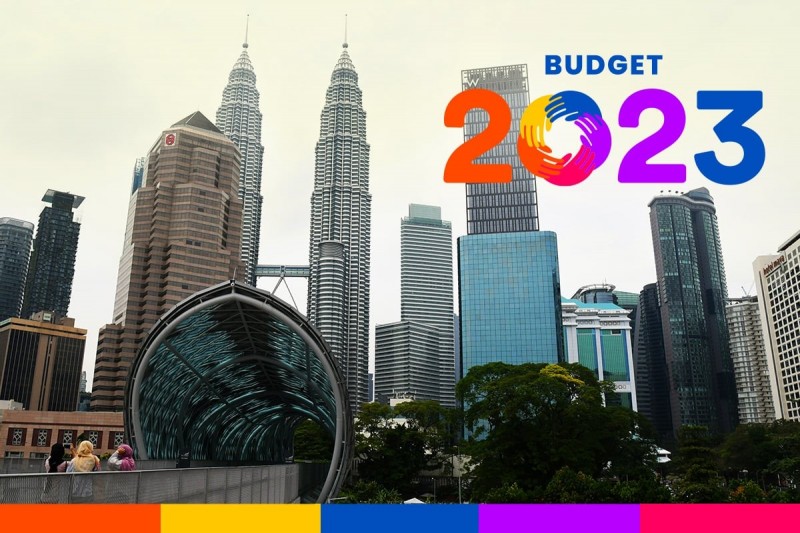
Image credit: The Edge Markets
KUALA LUMPUR: The current unity government should increase the 2023 Budget to address high inflation as well as cut leakages and procurement irregularities to boost its finance, economists said.
They also said there must be an urgency in reforming government finance through the budget.
Malaysia University of Science and Technology economist Dr Geoffrey Williams said the government did not need to scale back this year's budget because the 2022 Budget was already a record budget.
"Instead, it can be increased in line with core inflation by four per cent to RM345 billion, and revenues should target a similar level to last year of RM285 billion, which will reduce the deficit as a percentage of the country's gross domestic product (GDP).
"Then, within the new budget, efficiencies and adjustments can be made to meet core spending more economically and provide scope for extra spending if necessary," he told the New Straits Times.
He said procurement irregularities must be addressed to find savings and cut leakages.
There will also be savings from subsidies reform which can be reallocated to core activities, especially welfare reforms.
"We do not need austerity or boom and bust, just fiscal prudence," he added.
Williams said part of this new initiative should also be to reform the revenue side to have a more efficient tax system with lower overall taxes and on the spending side to cut waste and leakages to focus on core deliveries.
"Mega projects should be based on economic needs and the likely economic impact on jobs, incomes and investment.
"So projects which are underway can be reviewed to be more efficient such as flood mitigation, others can be renegotiated, and some can be rescheduled," he said.
More private investment opportunities must be opened, and if the megaprojects are indeed economically viable, then private companies would be willing to invest, he added.
Universiti Kuala Lumpur Business School economic analyst Associate Professor Aimi Zulhazmi Abdul Rashid opined that the new budget would likely be smaller than the previous one.
"It will prioritise the people's welfare above all and focus on the targeted subsidy to reduce the deficit in the financial expenditure," he told the NST.
He said a smaller development budget was also expected but would be enough to spur the construction industry's recovery, known to be the economic catalyst.
Besides, he noted that the fight against corruption and cronyism would be reflected in a more transparent approach to the government's tenders and awards.
"The revised budget is highly anticipated not only being the first budget since Prime Minister (PM) Datuk Seri Anwar Ibrahim took over, but also how the PM himself as the finance minister will set the direction of the nation's growth.
"The budget will also outline the anticipated action plans to roll out the PM's vision of Malaysia Madani," he said.
AmInvest Research analyst said for the sustainability of government finance, the there must be an urgency in reforming government finance.
This is especially on the government's revenue stream, which eventually relates to two key fiscal metrics, namely fiscal balance and public debt.
"This is also in line with the PM's remark that fiscal deficit and the public debt will be reduced in stages," it said in a note.
AmInvest Research expects the budget to remain skewed towards expansionary given that the global economy is entering a soft patch period with a "mild" global recession looking likely.
In addition, the firm noted that continuous recovery of the domestic economy should be maintained as small and medium enterprises (SMEs) segments that had yet to return to the pre-pandemic level fully.
"We do not think the allocation to be significantly higher than RM372.3 billion that was announced earlier considering tight fiscal constraints.
"All people-friendly measures are expected to be maintained to ensure sustainable domestic demand given slower external trades," it said.
Reallocation from development expenditure allocated in the original budget towards providing support to SMEs may be possible.
It also noted that there might be a possibility for tax rate adjustments to the top income brackets for individuals.
"But if any, the quantum is expected to be small and will not be significant enough to dampen private consumption levels since the high-income individuals have a lower marginal propensity to consume," it said.
Subsidies related to food production and cash transfer programmes were expected to be maintained or improved, while the likelihood of targeted subsidies for fuel being rolled out was also on the cards.
"We expect any subsidy rationalisation to be cautiously implemented to avoid the situation of ballooning inflation.
Source: https://www.nst.com.my/business/2023/02/879605/call-bigger-2023-budget

